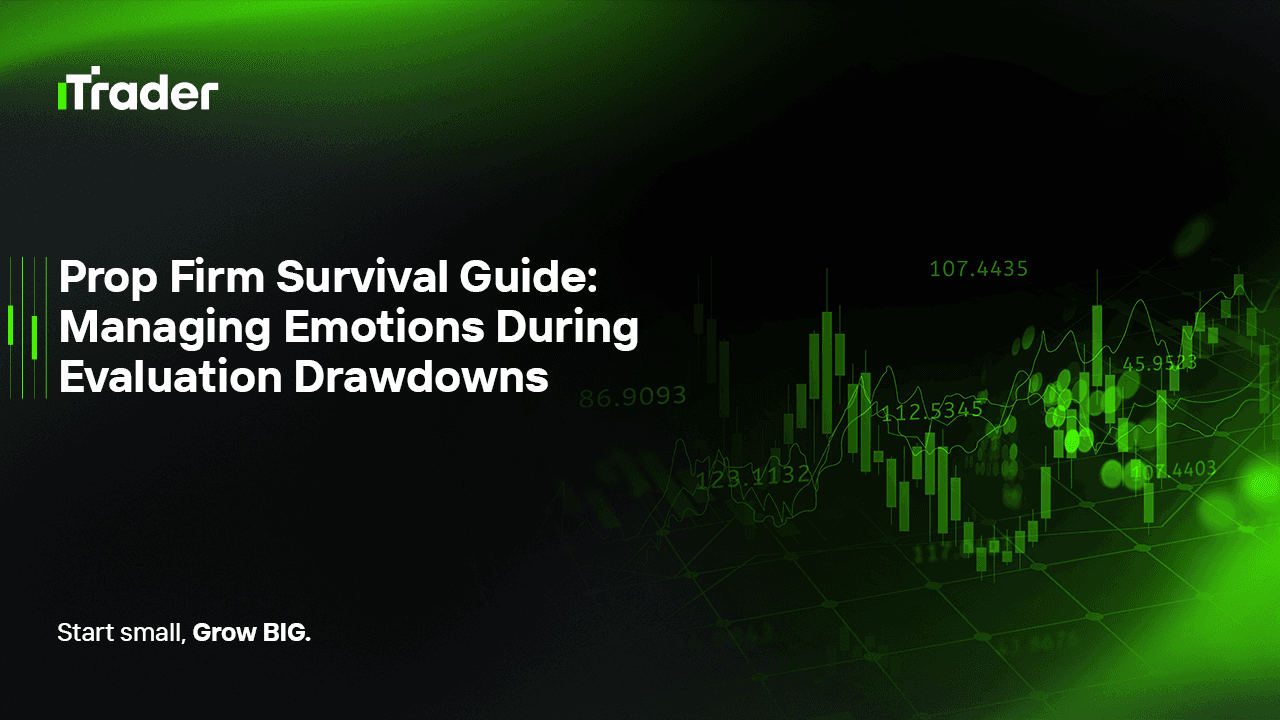2025-09-26
Prop firm challenges have become a gateway for aspiring traders to access larger trading capital. Passing such an evaluation means you can move beyond trading with your own limited funds and manage a professionally funded account. But behind this opportunity lies strict rules, unforgiving risk limits, and a true test of a trader’s discipline.

Most new traders prepare heavily on the technical side—indicators, strategies, backtests—yet they overlook the psychological challenge. The truth is that many traders fail not because of poor systems, but because they could not control their emotions when equity dropped. Drawdowns, in particular, are the most critical mental test.
This article explains what drawdowns are, why they matter in prop challenges, the emotional struggles they bring, and most importantly—how to manage them like a professional while staying beginner-friendly in approach.
A drawdown represents the decline in your account’s equity from its peak to the lowest point. For example:
Prop firms enforce strict limits such as:
Breaking either limit results in immediate disqualification, regardless of prior profits. That’s why drawdowns aren’t just numbers—they are the ultimate test of your risk management and discipline.
A drawdown is not just financial—it’s psychological. Traders under pressure often experience:
The thought of “I’m going to fail this challenge” leads to hesitation or closing trades too early.
Believing “The market is against me” can trigger impulsive decisions, breaking rules in search of quick revenge.
“I’m not good enough to be a trader” erodes confidence, leading to missed opportunities or giving up entirely.
The urge to win back losses quickly leads to oversized positions and risk-taking that only deepens the drawdown.
These emotions, if unmanaged, push traders into a downward spiral that usually ends with failing the challenge.
Have mechanical stop-points before emotions take over:
Such rules keep you from emotional overtrading.
Accept that drawdowns are part of the game, not proof of incompetence. Every system has natural fluctuations.
When emotions spike, step away. Deep breathing, a short walk, or even 10 minutes of detachment can reset your decision-making clarity.
Document how you feel during drawdowns. Over time, patterns emerge, giving you awareness of triggers that lead to mistakes.
Professional traders use meditation and visualization to mentally prepare for drawdowns, training the mind to stay calm under stress.
Experienced traders emphasize:
As one seasoned trader put it:
“You cannot control the market, but you can always control your response to it.”
Passing a prop firm challenge requires more than a profitable system. The real difference between those who succeed and those who fail lies in emotional control during drawdowns.
If you can:
you won’t just survive the challenge—you’ll build the foundation for a sustainable trading career.
In the end, the goal is not just to win trades, but to survive long enough to succeed.
© 2025 iTrader Global Limited | 公司注册号 15962
iTrader Global Limited 位于科摩罗联盟安儒昂自治岛穆察姆杜 Hamchako,并受科摩罗证券委员会(Securities Commission of the Comoros)许可及监管。我们的牌照号为 L15962/ITGL。
iTrader Global Limited 以“iTrader”作为交易名称,获授权从事外汇交易业务。公司的标志、商标及网站均为 iTrader Global Limited 的专属财产。
风险提示: 差价合约(CFD)交易因杠杆作用存在高风险,可能导致资金快速亏损,并非适合所有投资者。
交易资金、差价合约及其他高杠杆产品需要具备专业知识。
研究显示,84.01% 使用杠杆的交易者会遭受亏损。请务必充分了解相关风险,并确认在交易前已做好承担资金损失的准备。
iTrader 特此声明,不会对任何个人或法人在杠杆交易中产生的风险、亏损或其他损失承担全部责任。
本网站提供的新闻及信息仅用于教育目的。用户应独立且审慎地作出金融决策。
限制条款: iTrader 不会向法律、法规或政策禁止此类活动的国家或地区居民提供本网站或相关服务。若您居住在限制使用本网站或服务的司法管辖区,您有责任确保遵守当地法律。iTrader 不保证其网站内容在所有司法管辖区均适用或合法。
iTrader Global Limited 不向以下国家/地区的公民提供服务,包括但不限于:美国、巴西、加拿大、以色列及伊朗。